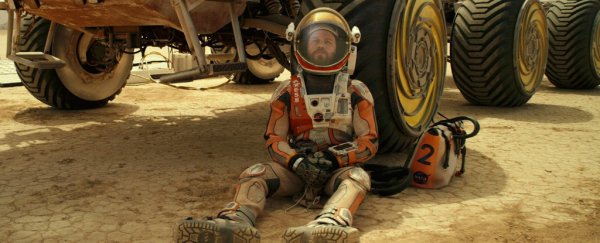A new study has revealed that compounds present in the Martian soil can wipe out whole bacterial cultures within minutes.
Researchers have had their suspicions over whether microorganisms can actually survive on the surface of the Red Planet, and now lab tests are spelling doom for any potential little green bacteria. And yeah, growing potatoes on Mars might be more difficult than we thought.
The problem here lies with perchlorates - chlorine-containing chemical compounds that we first detected on Mars back in 2008. These salty compounds are also what makes water on the Martian surface stay liquid, essentially turning it into brine.
Perchlorates are considered toxic for people, but they don't necessarily pose a problem for microbes. And because they keep surface water liquid, on Mars the presence of these compounds could even be beneficial for life - or so we thought.
Researchers from the University of Edinburgh have now confirmed that when you pair the compounds with intense ultraviolet (UV) light exposure, things become grim for any life forms.
"Perchlorate, although stable at room temperature, is a powerful oxidant when activated, for instance at high temperatures," the team writes in the study.
One way to turn a perchlorate into an oxidant is to expose it to UV light, and since Mars has a much thinner atmosphere than Earth, there's plenty of this kind of radiation on its surface.
The scientists took a common spacecraft-loving bacteria, Bacillus subtilis, and subjected them to Mars-like conditions.
The bacteria got a swim in a magnesium perchlorate solution of a similar concentration to how it's found on Mars, and then got exposed to UV light of the same general wavelength as that which bathes the Martian surface.
None of the bacteria survived this test. In fact, they died within 30 seconds.
The team also exposed the bacteria to UV rays without the presence of perchlorates, but even that still wiped the colony out within about a minute.
Of course, a planet's surface is not as barren and wet as a petri dish. With that in mind, the researchers also tested a scenario in which the microbes hung out on Mars 'rock analogues' made out of silica.
These conditions made it slightly easier on B. subtilis, but unfortunately most of them still died out. Which means that if there's life on Mars to be found, it's probably hiding quite far down beneath the surface of the planet.
"Although the toxic effects of oxidants on the Martian surface have been suspected for some time, our observations show that the surface of present-day Mars is highly deleterious to cells, caused by a toxic cocktail of oxidants, iron oxides, perchlorates and UV irradiation," the researchers write.
If the salty brines trickling across the rocks on Mars really are concentrated perchlorate streams, that's not an environment fit for sustaining life. And because perchlorates are all over the Martian soil, the team says this basically renders much of the planet's surface uninhabitable.
But there's also a positive. If Mars soil kills Earth's microbes on contact, that could actually be a good thing when it comes to planetary protection - there's less of a chance that our future Mars missions could irreparably contaminate the neighbouring planet.
The scientists are hoping to do follow-up work to find out exactly how the deadly cocktail on Mars surface kills living cells.
The study has been published in Scientific Reports.
